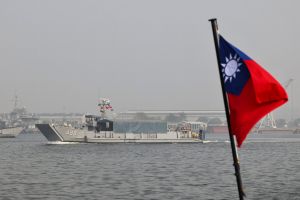2021 Chicago Council Survey data show a majority of Americans support a range of US policies towards Taiwan: recognition as an independent country, inclusion in international organizations, and a US-Taiwan free trade agreement.
Tensions between Beijing and Taipei are running high. Chinese intimidation of Taiwan has increased since 2016, demonstrated by naval drills in the Taiwan Strait, incursions into Taiwanese airspace, and economic coercion targeted at Taiwanese industries. In turn, the United States has sold advanced weapons to Taiwan and normalized US warship transits nearby. While past administrations have not made formal commitments to defend Taiwan, the just-completed 2021 Chicago Council Survey finds that for the first time, a slim majority of Americans now favor sending US troops to defend Taiwan if China invades.
Key Findings
- The American public supports a range of US policies in support of Taiwan. Majorities favor US recognition of Taiwan as an independent country (69%), supporting its inclusion in international organizations (65%), and signing a US-Taiwan free trade agreement (57%).
- A slimmer majority (53%) support the United States' signing a formal alliance with Taiwan, and a plurality (46%) favor explicitly committing to defend Taiwan if China invades.
- When asked about a range of potential scenarios, just over half of Americans (52%) favor using US troops to defend if China were to invade the island. This is the highest level ever recorded in the Council’s surveys dating back to 1982, when the question was first asked.
- Republicans (60%) are more likely to support sending US troops to Taiwan’s defense than Democrats (50%) or Independents (49%) – see appendix for more information on partisan divides and Taiwan.
- At the same time, Americans are divided over whether the United States should (50%) or should not (47%) sell arms and military equipment to Taiwan.
- Distrust of China is a significant factor in US public support for Taiwan: while most Americans see Taiwan as an ally (30%) or necessary partner (30%), most see China as a rival (32%) or an adversary (29%).




Methodology
This analysis is based on data from the 2021 Chicago Council Survey of the American public on foreign policy, a project of the Lester Crown Center on US Foreign Policy. The 2021 Chicago Council Survey was conducted July 7–26, 2021, by Ipsos using its large-scale nationwide online research panel, KnowledgePanel, among a weighted national sample of 2,086 adults, 18 or older, living in all 50 US states and the District of Columbia. The margin of sampling error for the full sample is +/- 2.33 percentage points, including a design effect of 1.1817. The margin of error is higher for partisan subgroups or for partial-sample items.
Partisan identification is based on respondents’ answer to a standard partisan self-identification question: “Generally speaking, do you think of yourself as a Republican, a Democrat, an Independent, or what?”
The 2021 Chicago Council Survey is made possible by the generous support of the Crown family and the Korea Foundation.
Additional results come from the Council’s 2021 Trilateral Survey, part of a larger project focusing on US-Japan-South Korea cooperation. This survey was conducted by Ipsos from March 19 to 21, 2021, using its large-scale online research panel, KnowledgePanel, among a weighted national sample of 1,019 adults 18 or older living in all 50 US states and the District of Columbia. The margin of sampling error for the full sample is +/- 3 percentage points. This survey was made possible by the generous support of the Carnegie Corporation of New York, the Korea Foundation, and the Nakasone Peace Institute.

Related Content
 Defense and Security
Defense and Security
"The American people can no longer delay on firm, concise action toward Taiwan," Commander Michele Lowe and Alice Cho explain.
 Defense and Security
Defense and Security
Both the United States and China claim to want peace and stability. But keeping the peace will require foregoing zero-sum games, something neither side looks ready to do.

